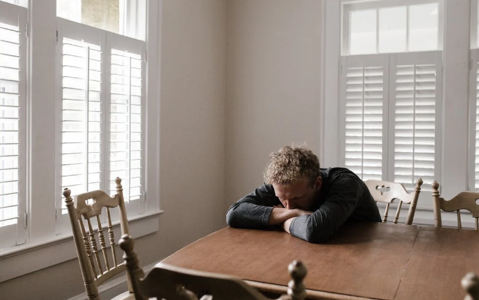 Stephen Geller Katz LCSW-R
Stephen Geller Katz LCSW-R
Misophonia Cognitive Retraining Therapy
 Stephen Geller Katz LCSW-R
Stephen Geller Katz LCSW-RMisophonia Cognitive Retraining Therapy
Misophonia Cognitive Retraining Therapy, as featured on the MTV True Life episode: “I Have Misophonia” premiering Friday, December 16th, 7:00 PM EST. See Clip >
|
|
|
| Moderate to severe anxiety triggered by chewing sounds, including: | ||
|
|
|
You may also be affected by visual stimuli, such as repetitive foot or body movements, fidgeting or movement you observe out of the corners of their eyes. Intense anxiety, rage and avoidant behavior may develop as a result of misophonia.
 * Do you feel your family and friends don’t understand how much you suffer?
* Do you feel your family and friends don’t understand how much you suffer?
* Do you often feel you can just suffer through a social event where there is eating present only to find that you must “escape” before you have a panic attack?
* Do you find that some people are at first understanding and make some efforts not to make the triggering sounds in front of you, but soon forget and constantly have to be reminded, causing you to feel angry, anxious and depressed?
* Are you avoiding social activities that you enjoy because of the misophonia?
* Are you fearful of losing your job and/or is the misophonia effecting your job performance?
You may be a candidate for Misophonia Cognitive Retraining Therapy, or MCRT.
Stephen Geller Katz, LCSW-R, with over 20 years of clinical experience, a New York University graduate, developed Misophonia Cognitive Retraining Therapy and founded Misophonia Cognitive Center™ in response to the growing number of people with Misophonia coming to his private practice from audiologists and ENTs. He discovered that by helping people to retrain and reinterpret the thoughts around their Misophonia, anxiety and depression symptoms began to improve. But even more important so did the Misophonic trigger response.
Is misophonia a form of OCD? Misophonia is a relatively new condition that, unfortunately, not many people know a lot about. The mental disorder can sometimes feel like someone is having a jarring overreaction to the sounds they are hearing, which can be as mundane as people breathing or chewing.
The worst part about these triggers is that people with misophonia can seriously react to them. While some can show that they are physically uncomfortable, others can flare out and become violent with the object or person producing that sound. It can especially be bad when an individual is producing these triggering sounds involuntarily.
However, many have been wondering about this condition since it started becoming popular if it has a connection with any other mental illnesses. More specifically, does it connect with OCD since many of the symptoms from both conditions are very similar?
And after extensive research into the field, researchers found that misophonia shares very similar symptoms to obsessive compulsive disorder (OCD), making it a form of OCD.
One of the most prominent symptoms of misophonia is that people can have acute sensitivity to sound. While various studies show that people with the condition can have an overblown reaction to sounds like people screaming or loud bangs.
However, when introduced to some very mundane sounds, such as a pen clicking people chewing, they can have a visibly disturbed reaction to most sounds that people would otherwise not pay much attention to.
Similarly to misophonia, there are different types of OCD that an individual could face where they will have selective sensitivity to different sounds. It was the starting point that various clinicians and researchers used to find any possible overlap between both mental conditions.
Similarly to OCD, people with misophonia can also present differently across various people. While some can show more severe symptoms of the condition, others can have relatively milder symptoms, further increasing the similarities between misophonia and OCD.
Nearly all people with the condition have a unique trigger, and their reactions can also vary. Some people can only get annoyed or irritated by certain sounds, which means they can usually control how they feel by those specific sounds. However, some people can have very violent outbursts when introduced to their triggers, to the point where the individual enters fight or flight.
Therefore, they will likely try to stop the sound from the source, or they will try to get as much distance as they possibly can. The fight or flight response is also common among individuals with OCD, except that most people with the condition do not show as many violent tendencies.
Current research suggests that misophonia strongly relates to many of OCD’s obsessive symptoms.
Researchers have also gone in depth when finding the different types of sound triggers that can affect people with Misophonia. While the obvious triggers are still there, like people breathing and or women speaking loudly, there are more specific sounds. These can include my brother’s breathing or my father’s chewing. These specific types of sound triggers show that Misophonia is likely fueled by trauma.
Despite being a fairly recent mental illness, misophonia researchers have been able to learn much about the disorder. By finding connections with other mental illnesses, treatments for misophonia can be more effective.
If you’re struggling with misophonia and have extreme reactions to small sounds, noises, or actions of other people, then get a consultation from Stephen Katz LCSW. Dr. Katz developed and is an expert at cognitive behavioral therapy for misophonia. With over 20 years of experience treating and in some cases curing misophonia and tinnitus, Dr. Katz is leading the research and treatment of these conditions.
Call today to schedule a convenient online consultation.
Stephen Geller Katz LCSW-R
646-585-2251
Tele-Video Sessions
Speaks 5 languages
International Patients Welcome
Is there a relationship between OCD and misophonia? Do you get angry when someone chews food or makes loud sounds around you? Have you ever snapped when someone was breathing too loudly? Do you feel irritated when you hear someone sniff, sigh, or snore? If you experience these situations, then you might be suffering from misophonia. The literal meaning of misophonia is hatred of sounds, which is a Greek word. For normal people, misophonia feels like when someone scratches nails on a chalkboard.
This makes them squirm with displeasure and forces them to react and stop that annoying sound. But for a person suffering from misophonia, experiencing a similar situation is a routine. Every day, they hear different yet normal sounds and feel the same. Many people associate the condition with OCD, perhaps because both conditions psychologically occur in the same region of the brain. Let’s understand in detail what OCD is and if it relates to misophonia.

OCD or obsessive-compulsive disorder is a psychological condition in which a person experiences obsessions and/or compulsions. The brain of a person suffering from OCD generates repeated unwanted sensations or thoughts. They also experience the urge to perform the same activity over and over again until they feel satisfied. Some people have both compulsions and obsessions. Many people confuse OCD with nail-biting habits and other negative thoughts. However, that isn’t true, as obsessive thoughts cause an unsettling feeling. An obsession can be about defining a color or number, good or bad. On the other hand, a compulsive habit is when you perform an activity repeatedly, such as washing your hands multiple times, especially after touching items that could or could not be dirty. Although you try not to do these activities, your brain tells you to, making your feel powerless. Everyone has different thoughts or actions that they repeat sometimes. But people suffering from OCD have actions or thoughts that:
Misophonia is a behavioral and neurophysiological condition in which a person flips out when they hear certain noises or triggers. The triggering sound can be low or higher in volume, or perhaps others may not even notice. But, it can easily trigger a person with misophonia. Many people confuse misophonia with OCD. Let’s understand how these conditions relate to each other:
Misophonia and OCD are different conditions that came into the spotlight recently. Experts need to learn a lot about misophonia because there is limited information about how this condition reacts. Recently, researchers found some new information about these conditions. This includes the link between both conditions.
People with misophonia exhibit the same coping mechanisms as people with OCD. The only difference between their coping mechanisms is how they apply them. Since misophonia relates to unpleasant sounds and is a more isolated condition, dealing with this condition requires a pair of noise-canceling headphones. That way, misophonia patients can create a trigger-free environment around them.

In both misophonia and OCD, the body responds in the same manner. When a person is in contact with a triggering sound, or they notice any activity that doesn’t seem right, they will feel discomfort. The certain irritant in both conditions leads to the involuntary response by their body. In both conditions, a person can get violent and feel physical sensations as a result of a trigger. The symptoms for both mental disorders are the same, such as an increased heart rate. However, the exact mechanism is still unknown, so it is hard to draw a clear conclusion.
Regardless of so many similarities, there are some inherent differences that you need to consider before attempting to diagnose yourself. For starters, the diagnosis process for both these conditions is different. Also, you should visit different specialists for the treatment. If you notice that you are suffering from misophonia, you need to consult an audiologist with extensive experience in the field. Finding a misophonia specialist can be difficult, as the condition is relatively unpopular. But, if you live in NYC, there is good news for you. You can visit the Misophonia Cognitive Center and consult with top sound disorder specialist Stephen Geller Katz.
When you visit our clinic for misophonia treatment, our specialists will diagnose your condition and identify your triggers. Every misophonia patient has different triggers. After identification, they will try different methods to mask and reduce the effects of certain sounds. If you want to learn more about your condition and treatment options, give Stephen Katz LCSW a call and schedule a free consultation online or by phone today.
MISOPHONIA COGNITIVE CENTER™
19 West 34th Street
Penthouse Floor
New York, NY 10001
646-585-2251
Is there a link between misophonia and OCD? OCD is short for Obsessive Compulsive Disorder. People who suffer from OCD feel forced to do certain actions repeatedly as a result of disturbing and unwanted thoughts. These thoughts are beyond the individual’s control, and the obsessive behavior is just an attempt to counter the thoughts. OCD is similar to misophonia in the sense that misophonia also tends to mess with the sufferer’s headspace and keeps their brain occupied with negative thoughts towards specific sounds.
Doctors claim that there is a link between the two. Like misophonia, OCD too ranges from mild to extreme. That is, reactions depend on the intensity of the sufferer’s condition. Treatments must be tailor-made by a specialist who will be able to link misophonia to other potentially related disorders like anxiety and OCD.
Misophonia causes physical reactions like an increase in blood pressure and heart rate which is another common factor. If the blood pressure frequently stays high, it is an alarming situation and requires immediate medical attention. Sometimes OCD patients also complain of sound sensitivity which means that there is a chance that there can be traces and presence of misophonia in OCD patients. Such patients often seek hypnotherapy so that both their issues are looked after. It helps get rid of intrusive thinking and getting the thought pattern fixed.
Even though doctors have spotted similarities between the two, it is still important to note that both exist individually as well, which means that they have separate treatment procedures and separate diagnosis. They are mostly said to be interlinked since both compel sufferers towards obsessive behaviors, that hinder their personal growth and comes in the way of their routine activities.
An example of the thought patterns of an OCD patient would be them thinking that maybe they forgot to switch off the light of their bedroom before leaving for work. Now their behavior would revolve around this sudden thought, making them all panicky and sweaty. It means OCD has more to do with internal stimuli. Their thoughts are only limited to them and are internal. However, misophiacs behave the way they do because of external stimuli- sound and noise. These sounds cause them to get frustrated and force them to yell out of aggression.
Both OCD and misophonia have different coping techniques as well. People with misophonia can counter their irritation by wearing earplugs or listening to music depending on the intensity of their condition. This coping technique will temporarily drown out the external noise while individuals suffering from OCD have to look for rather different and relatively intense coping techniques.
In recent times, both misophonia and OCD have gotten attention from researchers and doctors who are trying to come up with more treatment options with the help of technology and the knowledge of the brain chemistry of patients with OCD and /or misophonia. These advancements will hopefully make things easier for them.
To conclude, self-diagnosis and recognizing symptoms of both or one is not a safe thing to do. Seek professional help discuss your symptoms, and get to know about your problem in detail by scheduling an appointment with the best misophonia specialist in NYC. Clear out all your confusions and queries. Who knows, you may be a single appointment away from your ultimate goal. So what are you waiting for? Book an appointment today.
Stephen Geller Katz
19 West 34th Street
Penthouse Floor
New York, NY 10001
646-585-2251
Misophonia and OCD are two conditions that only recently have started to receive proper attention in medical circles. Misophonia, in particular, still has a long way to go before everyone has proper access to the kinds of treatment procedures they may need to deal with the condition properly. On the bright side, the increased attention in recent times has resulted in many new discoveries floating up to the surface, including new potential links between misophonia and conditions like OCD.
 Both misophonia and OCD boil down to the same essential set of points: a person gets triggered by a certain irritant, causing an involuntary response by their body that typically manifests itself as a feeling of discomfort, or even a physical urge to react. Both conditions can also trigger physical sensations in the body as well, such as an increased heartrate when the trigger isn’t properly addressed, although the exact mechanism through which this occurs remains largely unknown, and it’s therefore difficult to draw a concrete conclusion on a possible link in this regard.
Both misophonia and OCD boil down to the same essential set of points: a person gets triggered by a certain irritant, causing an involuntary response by their body that typically manifests itself as a feeling of discomfort, or even a physical urge to react. Both conditions can also trigger physical sensations in the body as well, such as an increased heartrate when the trigger isn’t properly addressed, although the exact mechanism through which this occurs remains largely unknown, and it’s therefore difficult to draw a concrete conclusion on a possible link in this regard.
People who deal with misophonia usually find that they develop a similar set of coping mechanisms to address the condition as do those with OCD – the only real difference is the context in which those mechanisms are applied. Since misophonia is a more isolated condition specifically related to responding to unpleasant sounds, dealing with its related irritants is usually as simple as getting a pair of noise-cancelling headphones and sticking to environments that are known to be free of triggers.
Despite the similarities between the two, there are also some inherent differences that have to be carefully observed by an individual attempting to diagnose themselves. The most important point to consider is that the two conditions are diagnosed in very different ways and require the attention of different specialists. If you suspect that you might be dealing with misophonia, you’ll need to consult a physician that has specific experience in that area.
Finding one that you can trust can be a bit tricky due to the relatively unpopular status of the condition at the moment.